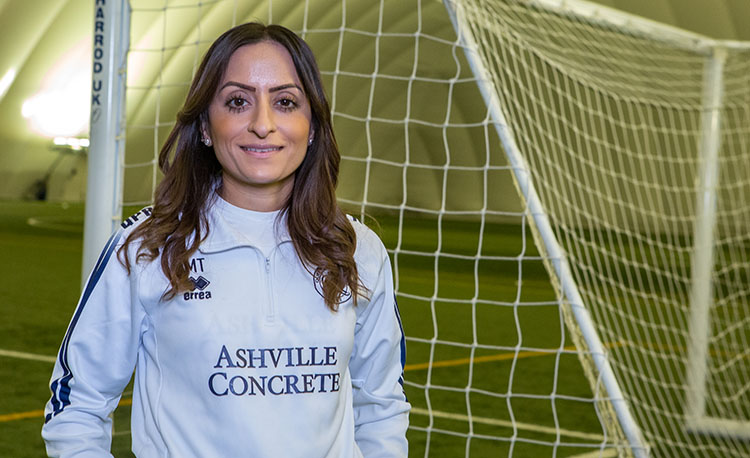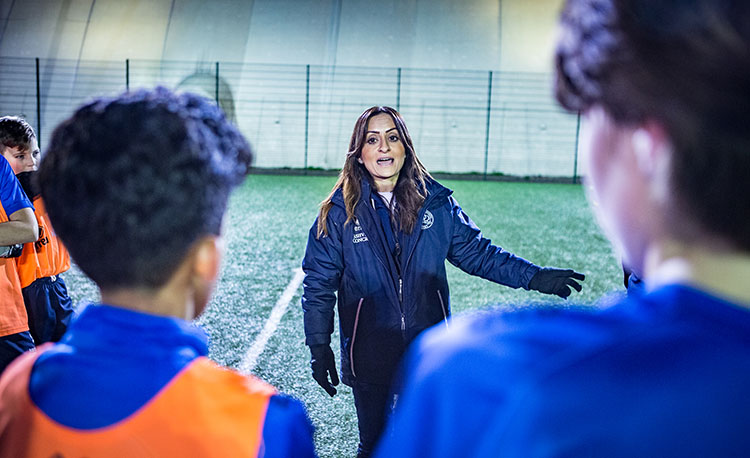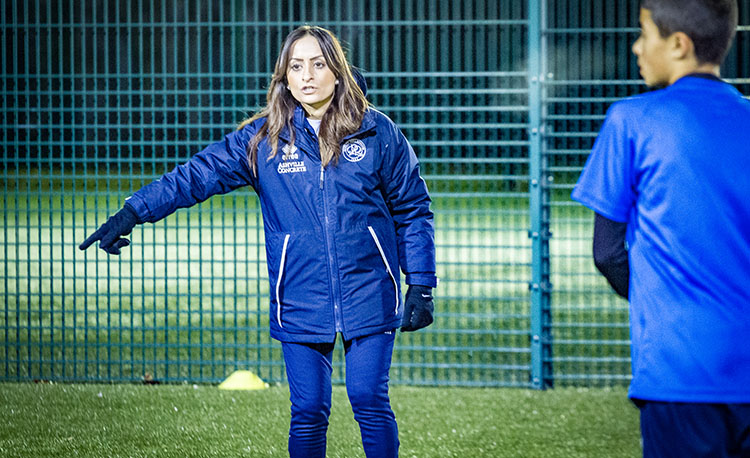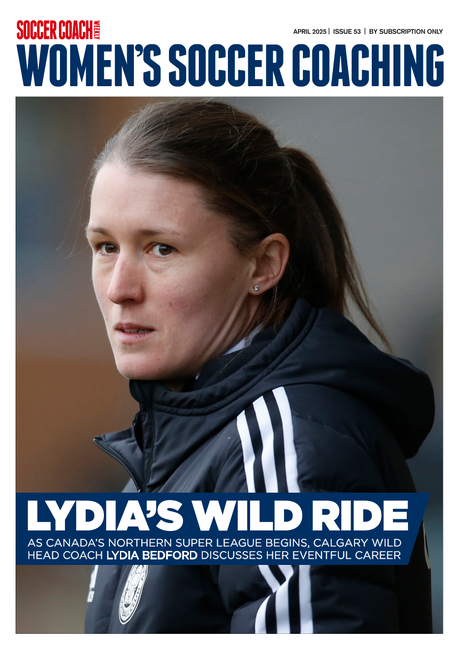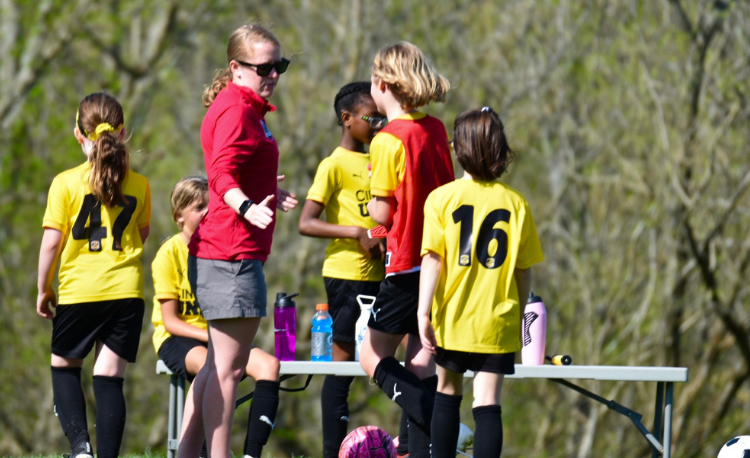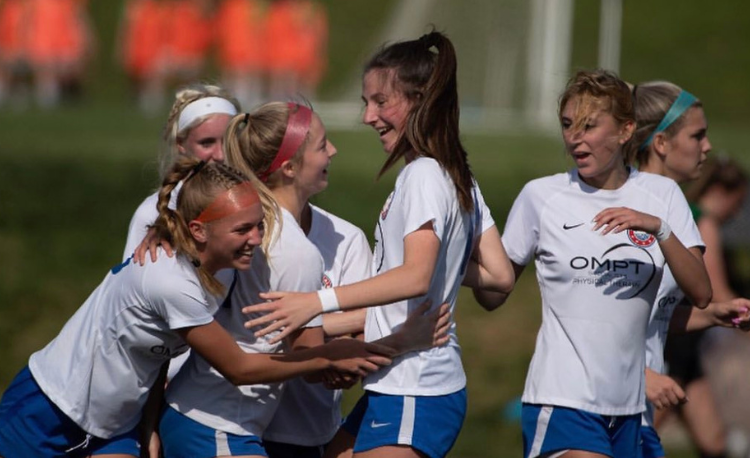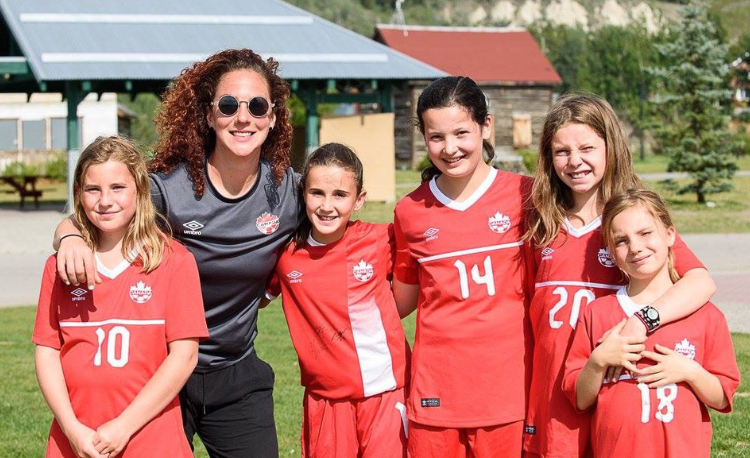You are viewing
1 of your 3 free articles
Going all inclusive
QPR’s assistant head of coaching MANISHA TAILOR is used to breaking down barriers. She tells STEPH FAIRBAIRN about her journey, learning from a mentor and making coaching more diverse to end the “old boys’ club”...
There was a time when Manisha Tailor, MBE, was completely disconnected from football.
Having played the game as a young girl during the early 1980s - a time Tailor says had very few opportunities for women and young girls, particularly those of a South Asian background - she stepped back from the sport she loved in the late 1990s.
In 1998, along with the rest of her family, Tailor became a carer for her twin brother, the person she had enjoyed playing soccer with during her formative years.
As an 18-year old, he had been severely bullied and went on to develop depression and schizophrenia, which resulted in him being sectioned, the UK’s term for involuntary commitment. It was at that point that Tailor said goodbye to football.
“It was tough,” she told Women’s Soccer Coaching. “I disconnected myself from football for quite a while, simply because I thought I didn’t want to bring back any positive memories, because I was angry.
“There was also a sense of guilt. I’m sure others are able to empathise with that. If something tragic happens, you sometimes feel guilty about actually being happy. That played on my mind a lot.”
Now, more than 20 years later, Tailor is more connected with the game than ever.
In June this year, having spent three years as the lead foundation-phase [ages 5-11] coach at Queens Park Rangers, she was promoted to assistant head of coaching.
“If something tragic happens, you feel guilty about actually being happy...”
With the promotion, Tailor made history, becoming both the first woman and the first person of South Asian heritage to take on a role of its kind in the English game.
She founded Swaggarlicious, a company which aims to tackle mental health through soccer. In 2017, she was honoured by Queen Elizabeth II, being made an MBE [Member of the British Empire] for ‘services to football and diversity in sport’.
More recently, Tailor published the book 50 Wellbeing Lessons for the Diverse Primary Classroom, which seeks to empower teachers to manage and facilitate conversations with children about their wellbeing, while representing a diverse range of children from various backgrounds.
Tailor, 40, was a teacher herself for a number of years, qualifying as a headteacher in 2011. And it was through teaching that she returned to football.
Back in 2002, the headteacher of her school convinced her there was nothing wrong in having a kickabout with the children. The more she believed it, and the more she played, the more she was able to see the positive impact it had on the kids.
She set up various football clubs at lunchtimes and after school and soon realised she would be able to use sport to help people like her brother.
She said: “It showed me that a sport can be really powerful and that football is for everybody.
“There are people who are deaf that play, there are people who are blind that play football. There’s no reason why those with mental health and disabilities can’t be involved in the game”
Advocating for wellbeing, mental health, diversity and inclusion is the driver for everything that Tailor does. At QPR, where she works under long-term mentor Chris Ramsey, Tailor calls herself “a cog in the whole runnings of the department”.
Her role is to work with all of the age group teams, from the under-nines to the under- 16s, making sure the philosophy Ramsey sets is adhered to by the coaching staff and the players.
She says: “If I do my job well, it means Chris is able to work with the players in the Under-18s to Under-23s and the B team to help them get into the first team.
“If I don’t do my job well, it makes it difficult for him, because he’s having to firefight all of the bits he’s imparting on me.”
Tailor feels she and Ramsey - a former first-team manager of QPR, who is now the club’s technical director - have found the sweet spot in terms of what she does best.
“I understand where some of my strengths are,” she said. “I also feel that I’m getting better at understanding the landscape of the professional game.
“I don’t necessarily want to be the under- 18s coach. I’m not saying that will never happen but I enjoy working with the players, I’m having a great time in my job.
“I love the aspect of not being solely in charge, but being a great number two. I want to be a great number two to him, and then maybe to whoever it might be.
“That could be an assistant head of coaching job, based on what my strengths are and based on what Chris perceives my capabilities are with regards to organisation, all the logistics, the operational stuff, observing the coaches, being on the pitch.”
Being under Ramsey’s leadership has helped to provide Tailor with a safe environment to grow and develop in, something she feels is incredibly important for everyone from a minority group working as a coach.
“if Chris didn’t provide me with a safety net, I would find it difficult...”
She said: “At QPR, coming in as a South Asian woman, and working within the coaching department, if Chris didn’t provide me with a safety net, I would find it really difficult.
“People say, ‘football is an all boys’ club.’ And I’ll say, ‘You know what? Yes, it is’. There needs to be radical change. I know that there’s initiatives, and there’s programmes now, which is great.
“That has to continue, because that’s certainly benefited me. If it wasn’t for the Elite Coach Apprenticeship Scheme by the Premier League, I wouldn’t be in a full-time position to be able to at least show some of my capabilities, and to learn.
“But if it also wasn’t for an open environment, and having a boss and a board of directors that are embracing of inclusion, then I wouldn’t have been given an opportunity to volunteer anyway.
“Of course, I am more than qualified to do the role, but I’m also not the finished article and I think that part’s important.
“It’s a case of looking at: Does this person have the qualifications? What is their work ethic like? Can we help them get better?
“I had to reinvent myself. I worked 10 years in education before I started this career change. So I think that safety net’s really, really important.”
Related Files
MANISHA ON MAKING OUR CLUBS MORE DIVERSE AND INCLUSIVE
“When we are looking at inclusion, we have to look at it more holistically.
“The question to ask is, as an individual, are you championing all aspects of inclusion? Do you represent the demographic in which you work? If the answer is no, then do something to change it. For me, it is that simple.
“You cannot be at fault for where you live, for the area. If it is a predominantly white area and you have white coaches, of course that’s what you’re going to have.
“Then you have got to look at other aspects of inclusion and make sure you are diverse. Do you have women? Is there access for people with disabilities?
“Then you can also be an ally and a champion for ethnicity, too. I think it’s important for our own development and growth to learn about different cultures and find out about other people and the way they do things.
“I think it’s holistic thinking. Can we think more creatively about how we work? Ultimately, that is what’s going to develop adaptable players.
“We want to develop adaptability, we want to develop resilience. I think we as coaches can benefit from that as well.”
“HE’S SO INCREDIBLY EXPERIENCED”: MANISHA TAILOR ON WORKING WITH HER MENTOR AND BOSS, CHRIS RAMSEY
Manisha Tailor originally met Chris Ramsey in 2014 at a diversity and equality event at St George’s Park, the training HQ for the England national teams.
When they reconnected in 2016, Ramsey allowed Tailor to volunteer at the QPR Academy before she went on to secure a full-time role. Ramsey put Tailor forward for the Premier League’s Elite Coach Apprenticeship Scheme (ECAS).
Tailor said: “Chris is really firm but he’s also very fair. He gives you a lot of time, he listens.
“I think all those things are important: having someone who is going to listen, who is going to facilitate, and somebody who is going to give you some firm, assertive advice, because they know it is in your best interest.
“I think it also has to be somebody who has lived it. When you’re having the conversation, they can often help problem-solve it quicker if they have gone through some of those nuances.
“Sometimes it is a case of ‘go and find it out yourself’, but I think within the nature of this environment, it’s also about ‘just tell me what I need to do’.
“That’s how the relationship with Chris and myself is. It is ‘just tell me how I can navigate myself through this environment to be the best that I can be’. And because he’s so incredibly experienced, it’s helped me.
“I think having a decision-maker as a mentor is key. You need someone who’s going to have the power to influence change. If we do not have that, people like myself will struggle in these environments.
“It is all very well being qualified, but you have to be able to navigate your way through the culture.
“That’s difficult, because we are still far off seeing more women and more people from diverse backgrounds on the pitch.”
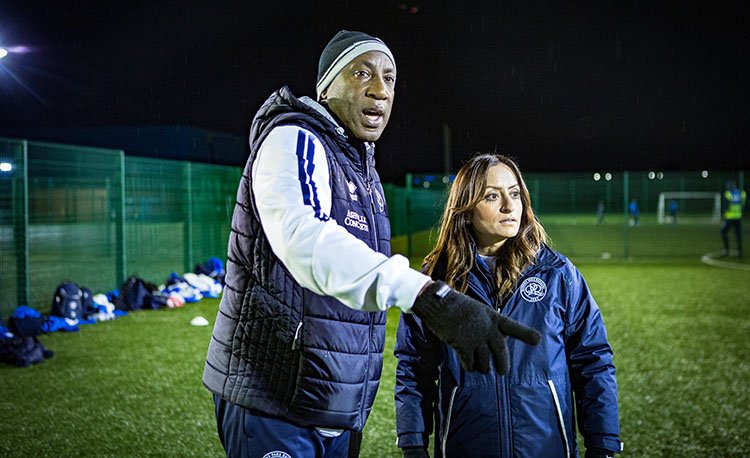
Even with that security beneath her, Tailor has had to build up a certain level of resilience to ensure she stays in the game.
She says the history she has made as a woman and someone from a South Asian background at QPR does spur her on to keep going in the “old boy’s club”, but it also adds a lot of pressure.
She said: “You feel there is a greater cause here and there is, because we understand, as women and as people from ethnic backgrounds, the importance of it.
“I think it’s great to know you can be in a position to influence change. For me now, it’s making sure that that continues.”
So how has she found her resilience? Tailor believes you have to find something that “intrinsically motivates you.” She added:
“I say that because of the level of pressure of the role, which will naturally come the higher you go in the hierarchy, but also the pressure with regards to being a minority.
“If you are the only female, or you are the only South Asian female, that also comes with stereotypes and this culture that you have to be able to flex with.
“Actually you shouldn’t have to flex with it. I shouldn’t have to keep adapting just because football is not where we need it to be. But I do have to do that.
“Unfortunately, I have to always be the one who is adaptable, I have to be more qualified, I have to show that I have a greater work ethic. If you don’t have something that intrinsically motivates you I think you will crumble.
“I think it’s great to know you can be in a position to influence change...”
“The biggest thing I’ve learned, coming into my sixth season - and I keep saying the same thing when I’m speaking to other women - is that you can be the best coach with all the qualifications, but if you are not resilient, and you cannot manage the environment, you will get eaten alive.
“Then you’ve got to imagine - what if you’re a black woman, or an Asian woman? Now it’s so multi-layered.”
Though frank about the limitations and difficulties facing women and people of colour who coach, Tailor is not without hope. She believes that, with work, it can change.
She said “I love being at the club, I love what I do, I wouldn’t change it.
“But that’s because I’m quite forward thinking, I’ve got a great mentor, I’ve got support from external people like Paul Holder at the Football Association.
“In order for you to succeed within such a challenging environment, be bold, be resilient, network, get a mentor, and make sure you put yourself in a position where you are qualified to then be able to apply for certain jobs. Then it’s a choice on whether you feel it’s right for you.”
And what about what’s right for her?
Tailor is determined to continue breaking down barriers.
“The fraternity of football isn’t going to change overnight. In order for me to continue that vision of making sure I’m not the only one, and that we have more women and more people from other backgrounds in these types of jobs, I’ve got to stay with it.
“Because otherwise how do things change?”
Newsletter Sign Up
Newsletter Sign Up
Discover the simple way to become a more effective, more successful soccer coach
In a recent survey 89% of subscribers said Women's Soccer Coaching makes them more confident, 91% said Women's Soccer Coaching makes them a more effective coach and 93% said Women's Soccer Coaching makes them more inspired.
*includes 3 coaching manuals
Get Inspired
All the latest techniques and approaches
Women's Soccer Coaching offers proven and easy to use soccer drills, coaching sessions, practice plans, small-sided games, warm-ups, training tips and advice.
We've been at the cutting edge of soccer coaching since we launched Soccer Coach Weekly in 2007, creating resources for the grassroots youth coach, following best practice from around the world and insights from the professional game.
